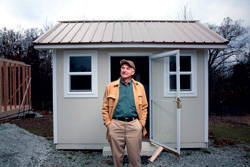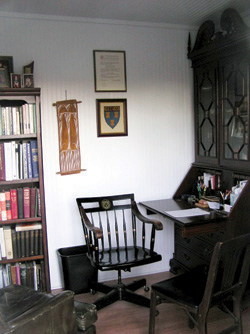Clients don't seem to mind nontraditional office arrangements

Larry Austin was initially surprised that clients were willing to come out to his cabin in rural Tennessee. But after business is done, they like to visit with the sheep. Photos by Hollis Bennett.
When clients call Larry Austin at his home-based office in rural Tennessee, it’s not unusual for them to hear the sound of farm animals in the background. No one seems to mind much.
Those who want to discuss business in person can drive out to Austin’s farm in Medon and meet with him in a 96-square-foot cabin nicknamed “Little Abe,” which, incidentally, has no electricity. No one seems to mind that very much, either.
“We’ll sit in there and do what we need to do,” says Austin, who does mostly estate planning and probate work. “It’s right across from the hay shed. Then they’ll want to see the sheep and the animals.”
Austin’s home-based operation may be at the extreme, but when it comes to working from home, solo practitioners have to consider how their clients will view them and whether it can harm or enhance their reputation.
In Austin’s case, it hasn’t been a problem. “I found it surprising to me how often Memphis clients are willing to drive 75 miles to see me,” he says. “I wouldn’t do it if I thought it upset my clients.”
In fact, he thinks they enjoy coming out for the sights and sounds, but maybe not the smells, of the farm.
Austin still drives into Memphis once a week to meet with new clients and rents an executive suite for those meetings. After that initial meeting, clients often volunteer to come out to the farm. “I think they’re pleased about it,” he says. “It’s surprised me.”

Little Abe’s interior.
DON’T ASK, DON’T TELL
Others are more cautious about broadcasting that they work from home.
Sarah Gold has a home-based practice outside of Albany, N.Y., but does not meet with clients there. “I normally go to my clients,” says Gold, who primarily does business transactional law. “They seem to appreciate the fact that they don’t have to come to me, and that I come to them.”
Her business address is at an Albany mailbox drop rather than home. “If I’m questioned about it, I will say I work from my home,” she says. “When I tell my clients where I am, nobody seems to care.” Gold, who was downsized from a hedge fund in 2009, briefly rented a cooperative workspace to keep the overhead low and have a place to meet clients in downtown Albany. But she has since left.
Her office is now in a spare bedroom, though she looks at it differently: “I have a phone. That’s where my office is.”
Andrew Cabasso is an attorney and co-founder of JurisPage, a New York City-based Internet marketing company that helps small firms and solo practitioners develop an online presence.
Cabasso works with many home-based solos who have “virtual offices,” where business can be conducted online from any location. Many also join shared office spaces or rent rooms as needed to meet with clients. “Generally, I don’t think clients are aware of where they’re working,” Cabasso says. “Many attorneys have practices completely online.”
And no one seems to mind much. “At the end of the day, clients care about the results they’re getting,” Cabasso says. “I think they couldn’t care less where the attorney is working from.”
This article originally appeared in the March 2014 issue of the ABA Journal with this headline: “At Home: Clients don’t seem to mind nontraditional office arrangements.”
Write a letter to the editor, share a story tip or update, or report an error.


